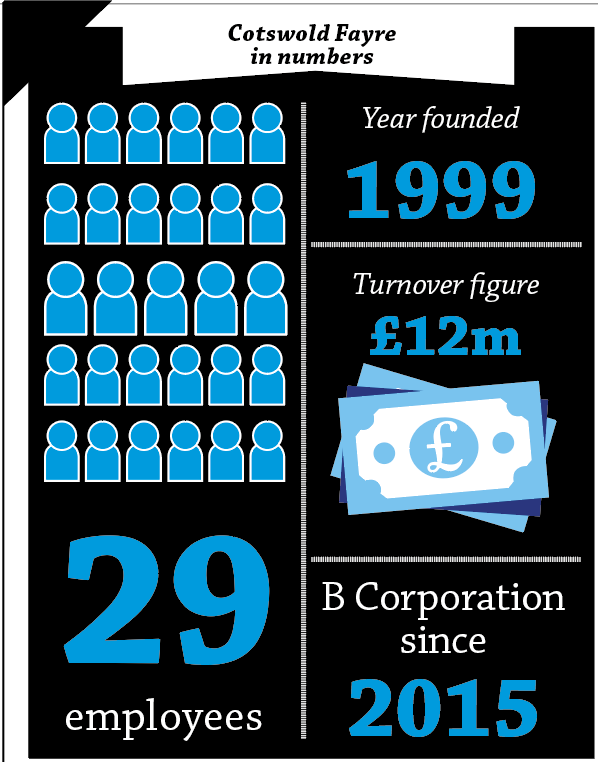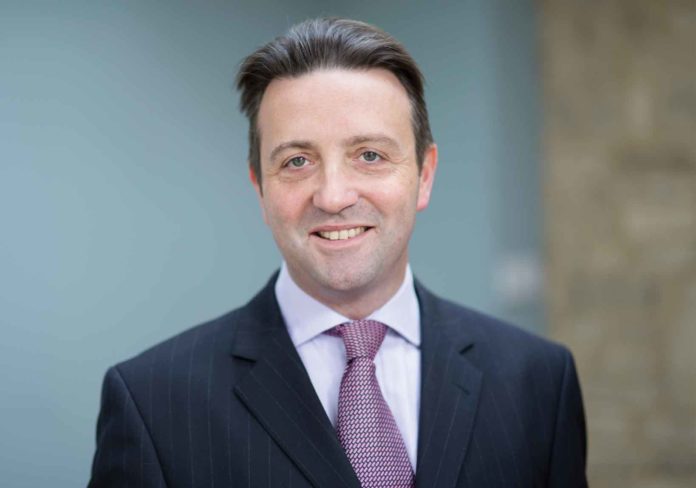Cotswold Fayre is a new generation of wholesaler. While the business needs to stay profitable, chief executive and founder Paul Hargreaves is just as focused on making sure its practices benefit the planet and his employees.
“We have been voluntarily assessed every two to three years, and companies that have reached a certain level in this certification are called B Corps,” he explains.
 With nearly 200 B Corps companies in the UK right now, Cotswold Fayre is one
With nearly 200 B Corps companies in the UK right now, Cotswold Fayre is one
of, if not the only, wholesaler on this list.
This means that the Berkshire-based company is certified to have met the highest standards of verified social and environmental performance, public transparency, and legal accountability to balance profit and purpose.
“What does this mean in practice?” Hargreaves asks. “We’re in an industry that is fortunate to have a business model, that, by its very nature, is carbon-reducing, with delivered wholesale taking vehicles off the road.
“We’ve also recently undertaken some modelling on this and aware that we can reduce ours even further by making changes to our logistics later in the year.”
Cotswold Fayre began in south-east London two decades ago as a side-project for Hargreaves, who would buy from brands around the Cotswolds region before selling them to local farm shops. “The business continued to grow, and the turning point came when I got back from a holiday to find my answering-machine tape had run out of roll. At that point, I knew I needed to decide either to embrace it properly, or stop.”
He joined forces with a partner based in Reading who was in charge of the logistical side of the company. The pair continued to operate from their separate locations. “As in any start-up, we were struggling initially and getting into debt, which is why my business partner decided to leave the company,” says Hargreaves. “I made the strategic decision to move to the Reading area and take on the business by myself.
“Shortly after this, we started becoming profitable. The business reached a point where, as long as we kept our costs in control, there was huge scope for growth.”
This growth began in the early days when Hargreaves sent out a simple postal survey. “It sounds strange in this day and age, because we have the internet, but I received 28 responses back from the 30 farm shops I sent it out to,” he explains.
“In this survey, I asked if they’d be interested in purchasing certain products if I were to offer the service. This demonstrated the massive need for a wholesale ordering system for farm shops.”
Coming back to 2019, Hargreaves has released a book that outlines how to run a business that makes a positive impact on the world titled ‘Forces for Good’. He is also in discussions about moving towards using electric vehicles for deliveries into London.
“As well as this, we are working with our suppliers on how they can improve their environmental credentials and recently hosted a conference named ‘Towards a Greener Future’ to help them do just that,” he says.
“Our aim as a wholesaler is to be the best employer within the sector. We encourage long holidays, pay higher than the living wage and create a fun working environment.
“Having a work place where people love to come to work will be a productive work place,” he adds.
As well as farm shops, the company also supplies garden centres, food halls, department stores, along with its fastest-growing segment of convenience and forecourts.
“Twenty years ago, we would never have supplied a convenience store, but now they’re a major part of what we do,” says Hargreaves.
“This is to do with the rise in popularity of speciality foods and retailers wanting to differentiate themselves from their competitors.
“They didn’t have the likes of Sainsbury’s Local or Tesco Express back then, either, so the competitive landscape has changed. Television shows and the rise of famous chefs such as Jamie Oliver were the catalyst for the public adopting a more exotic palette,” he adds.
“Farm shops are also huge organisations now. Back then, they would just be based in a small shed, but now you have the likes of Darts Farm shop in Devon having a turnover that is in the millions.”
Cotswold Fayre is also very selective with the products it stocks. “For every new brand we take on, we reject about 10, and the sort of suppliers we work with are normally happy if they’re working with Ocado, Waitrose and ourselves, as that covers a large majority of their target base,” he says.
Like every business, it has faced numerous hurdles over the years. Hargreaves says: “For 15 years, we continued to improve, but then plateaued around 2014 and stagnated for two years.
“It was at that point that we realised that we were too focused on logistics, so we project-managed a move to outsource our distribution.”
As a result, half the employees in the company now stem from the sales and marketing department, compared with previously,
when lorry drivers and warehouse workers made up the vast majority. “This enabled us to focus more on our customers, which put us back on a positive path of growth,” says Hargreaves.
“Within the next three years, the intention is to distribute my share of the business. I’ll be doing this by introducing an employee ownership option in which we create a trust fund where 20% of the shares are available to buy.”
With plans also in place to open up a farm shop in the next 12 months, Cotswold Fayre is primed to become even more successful from financial, sustainable and emotional standpoints.
60 Seconds With Paul Hargreaves
What is the best piece of business advice you can offer, or that you have been given?
Two things are more important than everything. One is to recruit the right people. The second is to go with your gut instinct.
What is your philosophy in regards to work?
Try not to split work from the rest of your life. If you have a workplace environment that people enjoy, then you have a much better company.
What do you get up to in your spare time?
I was a keen tennis player, but recently decided to quit as I wasn’t as good as I used to be, and therefore wasn’t enjoying it like I did before. This is why golf is my new hobby.








